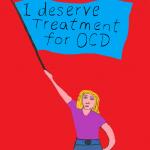More advice for teachers – supporting learners with OCD
It is important to support learners with OCD at school, whilst still encouraging them to achieve their goals.
Teachers, can play a major role in helping to identify young people who may have OCD and providing appropriate support at school.
If you feel that a young person may have OCD then it is important that these concerns are shared with the learner’s parents. Always follow your school’s protocol before taking action and be aware that learners may be sensitive around the idea that parents are being approached – particularly teens and young adults.
We are not suggesting that schools make a diagnosis but rather to be aware of the signs and how to support a learner with OCD. Just as many teachers are now familiar with spotting other conditions such as Dyslexia, Autism Spectrum Disorders and Anorexia it is important that staff are able to recognise OCD.
Formal diagnoses can only be made by qualified health care professionals, starting with the family’s GP. Once diagnosed, the recommended treatment is cognitive behaviour therapy, sometimes complemented with medication.
Progress is more likely to be made if you are able to work with the young person, their parents and therapist to agree on when to accommodate and when to challenge the young person’s OCD.
It may be useful to take note of some of the following points when considering how you could support a learner with OCD:
- Be patient and understanding! But at the same time, help learners with OCD to acquire good behaviour and to obey rules just as any child.
- If appropriate, liaise with the child’s therapist to help implement strategies in the classroom or identify ways you may be maintaining the child’s symptoms (e.g. giving reassurance).
- If the child becomes highly anxious in school, depending on their stage in treatment, you may help them ‘sit out’ their anxiety, discuss it, or take a very short planned break.
- Provide a safe haven for the learner to go to when they feel highly anxious.
- Identify a sign with the learner to indicate when they need ‘time out’.
- Identify a designated mentor to support the learner – someone they trust and feel comfortable talking with.
- Extending deadlines and decreasing workload both in lesson time and for homework assignments may be helpful; however, it is important that children with OCD are also supported in achieving their goals.
- Help the learner to focus on their strengths and areas they are confident in.
- Be aware that children with OCD may be easy targets and remain vigilant of any signs of bullying.
- Facilitate a classroom discussion or PSHE lesson about what OCD is, perhaps in the context of a wider discussion around anxiety or mental health.
- If the learner has had time off from school due to severe OCD, a graded return to school is often advisable to help them reintegrate in a manageable way. Joined-up support from parents, teachers and the child’s therapist can help facilitate this.






